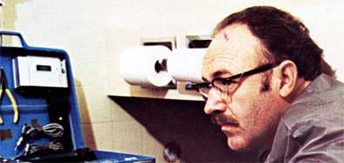
 In Michelangelo Antonioni's Blowup, a photographer takes a roll of shots of a woman and a man, in a park outside London, from a distance. In Francis Ford Coppola's The Conversation, a sound expert records a couple's whispered exchange in San Francisco's busy Union Square for a client. These men are left with a record of an event, one visual and one aural, from which they piece together a mystery and are sucked into the lives of their targets.
In Michelangelo Antonioni's Blowup, a photographer takes a roll of shots of a woman and a man, in a park outside London, from a distance. In Francis Ford Coppola's The Conversation, a sound expert records a couple's whispered exchange in San Francisco's busy Union Square for a client. These men are left with a record of an event, one visual and one aural, from which they piece together a mystery and are sucked into the lives of their targets.I love this dramatic premise. The lonely voyeur reconstructs a situation out of what he observes and realizes he must act, lest someone get hurt. Think Rear Window, though Hitchcock's masterpiece of voyeurism is cute and classic in its storytelling. Blowup and The Conversation are not.
The first is a product of the mod '60s (which Austin Powers sends up), the second of the bitter '70s (tainted by Watergate). Blowup was Antonioni's first English-language feature, his second in color. It's revered. But it doesn't add up for me. There is one stunning, fascinating sequence in the middle, when the suave, swinging photographer (David Hemmings) begins to blow up the faraway photos he's taken to look for clues for a possible murder. But the film siphons away any sort of build-up and payoff soon after, taking the allegorical route. If the film arrives at a conclusion, it's an abstract one. Was it a murder? Is anything really real, or is one person's reality another's fantasy?
The Conversation came in between the first two Godfathers, when Coppola had some down time. It's Coppola's best. It forgoes the flexing typical of a major filmmaker (The Godfathers, for me, are all muscle) and gets back to the arthouse maverick style Coppola probably exhibited as a film student. He did write the script as a student at UCLA, and it shows in the simplicity and directness of the story. A shy, paranoid man (Gene Hackman, in his finest performance) slowly refines the recording of a private conversation, word by word, until he thinks he's uncovered a murder plot.
Just like Blowup, right? The characters go deeper into their media to come to some sort of clarity or reality or truth, and this journey is commentary on the filmmaking process, naturally. Now that we know what we know, we have power and must act. But is it the right thing to do, and will people believe us and stand by us when we do it?
Again, wonderful premise. But I like where The Conversation takes it, from its exquisite opening sequence to the thrilling climax, the story propelled by a wonderful character who must break his own shell and, in the process, breaks his whole self. Blowup mopes through self-concious self-examination and is deliberately opaque, keeping us at a cold distance. It's very much "cinema of the cool." I resist that.
But side by side, Blowup and The Conversation engage in a nice tug-of-war over the same idea. Hemming's playboy photog and Hackman's introverted soundman. Both exposed by the expertise they hide behind. Like Antonioni and Coppola.
.jpg)



2 comments:
So complete the triology already and watch the low-rent version: De Palma's Blow-Out with Travolta, Nancy Allen and John Lithgow. Coppola's is the best and for years Antonioni's film was considered a masterpiece, now a fun oddity.
Plus, read the story all of these are based on: Julio Cortazar's "Blow-Up" (in Spanish, called "Las babas del diablo," which is translated as "Devil's Drool").
Yes, watch Blow-Out. Then explain to me what Pauline Kael and Quentin Tarantino are raving about. The former called it, "probably the best of all American conspiracy movies."
To be fair, No Way Out hadn't come out yet.
Post a Comment